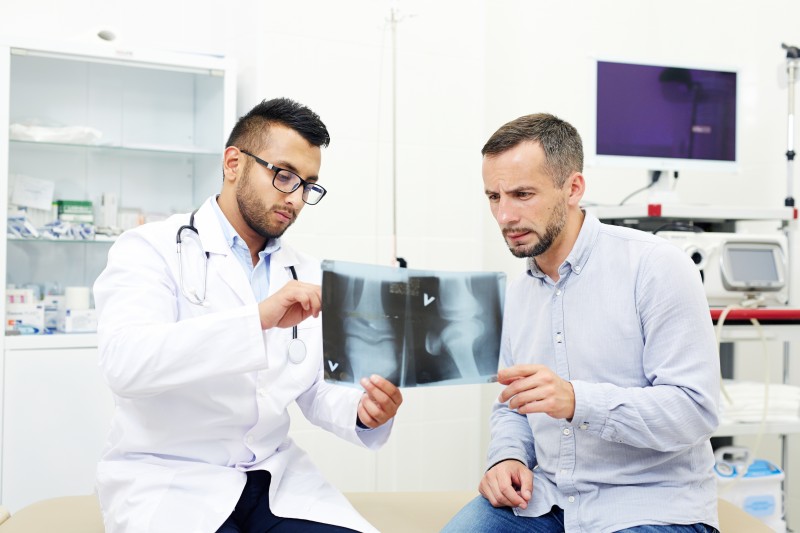Auto accidents, even minor ones, can have a devastating impact on your body. The sudden, forceful impact can cause a variety of orthopedic injuries, many of which may not be immediately apparent. While an emergency room can treat immediate, life-threatening conditions, a specialized orthopedic doctor is crucial for properly diagnosing and managing the musculoskeletal injuries that so often follow a car crash.
Understanding Common Auto Accident Injuries
The kinetic energy from an auto collision can wreak havoc on your bones, joints, ligaments, tendons, and muscles. These injuries often require specialized care for proper healing and long-term function.
Whiplash: The Silent Pain
Perhaps the most well-known auto injury, whiplash occurs when the head is suddenly and forcefully thrust forward and backward, straining the muscles and ligaments in the neck. Symptoms can be delayed and may include neck pain, stiffness, headaches, dizziness, and numbness or tingling in the arms. Because whiplash is a soft tissue injury, it may not show up on standard X-rays, making a specialist’s diagnosis essential.
Fractures and Dislocations: Immediate and Lasting Damage
The sheer force of a crash can cause bones to break (fractures) or joints to become dislodged (dislocations). These injuries can range from simple, hairline fractures to complex, comminuted fractures where the bone shatters into multiple pieces. Common fracture sites include the wrist, arm, clavicle, ribs, and legs. An orthopedic specialist has the expertise to accurately assess the extent of the damage and determine the best course of action, whether it’s setting the bone in a cast or performing complex reconstructive surgery.
Sprains, Strains, and Other Soft Tissue Injuries
Beyond whiplash, a car accident can cause damage to other soft tissues throughout the body. Sprains involve the tearing or stretching of ligaments, while strains affect muscles or tendons. These injuries are common in the ankles, knees, wrists, and shoulders, and while they may seem less severe than a fracture, they can lead to chronic pain and instability if not treated correctly.
Back and Spinal Injuries
The spine is particularly vulnerable in a car crash. Injuries can include herniated discs, spinal fractures, or even serious damage to the spinal cord. These conditions can cause debilitating pain, nerve damage, and in the most severe cases, permanent disability. An orthopedic specialist can use advanced diagnostic tools like MRIs to assess the spine and recommend treatments to stabilize the injury and preserve function.
The Crucial Role of an Orthopedic Specialist
An orthopedic specialist is a physician trained to diagnose, treat, and prevent disorders of the musculoskeletal system. When it comes to auto accident injuries, their expertise is invaluable.
Unlike a general practitioner, an orthopedic doctor has an in-depth understanding of the complex interactions between bones, joints, muscles, ligaments, and tendons. They can create a precise treatment plan that goes beyond addressing just the immediate pain. Their goal is to restore function, minimize long-term complications, and help you regain your quality of life. Treatment may include:
- Accurate Diagnosis: Using a combination of physical exams, imaging (X-rays, MRI, CT scans), and their extensive knowledge to pinpoint the exact injury.
- Non-Surgical Treatments: Recommending a personalized regimen of physical therapy, pain management injections, medication, or bracing.
- Surgical Intervention: For more complex injuries like severe fractures or torn ligaments, an orthopedic surgeon can perform specialized procedures to repair the damage.
Your Path to Recovery
After an auto accident, seeking prompt medical attention is paramount. While an emergency room visit is important for immediate care, a follow-up appointment with an orthopedic specialist should be a top priority. Their comprehensive approach will ensure that your injuries are properly documented and that you receive the specific, targeted care needed to heal completely.
Frequently Asked Questions (FAQs)
1. Should I go to the emergency room or an orthopedic specialist after an accident?
You should go to the emergency room immediately after a serious accident to rule out any life-threatening injuries. Once you are stable, schedule an appointment with an orthopedic specialist for a thorough evaluation of any musculoskeletal pain or symptoms.
2. I don’t feel much pain. Do I still need to see a doctor?
Yes. Many auto injuries, especially whiplash and other soft tissue injuries, may not show symptoms for days or even weeks after the accident. Waiting to seek care can lead to a more difficult and prolonged recovery.
3. Will my injuries from a car accident be visible on an X-ray?
Not always. While fractures are typically visible on an X-ray, soft tissue injuries like whiplash or a torn ligament are not. An orthopedic specialist may order an MRI or other advanced imaging to get a complete picture of your injuries.
4. How long does recovery from an auto injury typically take?
Recovery time varies greatly depending on the type and severity of the injury, as well as the individual’s overall health. Your orthopedic specialist will create a customized treatment plan and can provide a more accurate timeline.
5. What is the difference between a sprain and a strain?
A sprain is an injury to a ligament (the fibrous tissue connecting two bones), while a strain is an injury to a muscle or tendon (the tissue connecting muscle to bone). Both are common in auto accidents and are often treated with physical therapy and rest.
Don’t let an auto accident derail your health and well-being. The road to recovery starts with expert care. Visit our website https://orthoxpress.co/ to learn more about our services and contact us (214) 949-8918 today to schedule a consultation with one of our experienced orthopedic specialists. We’re here to help you get back on your feet.

